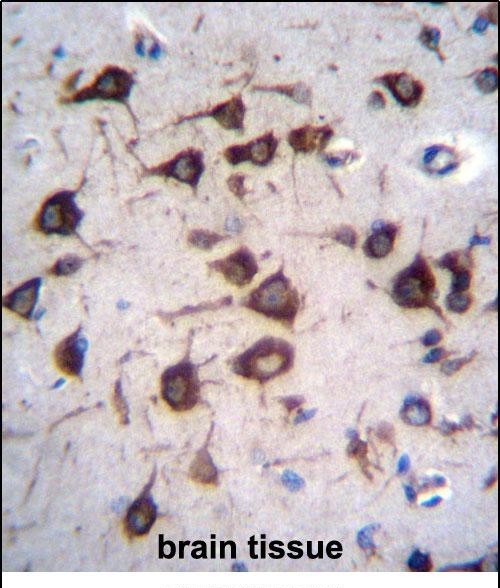

| WB | 1/1000 | Human,Mouse,Rat |
| IF | 咨询技术 | Human,Mouse,Rat |
| IHC | 1/100-1/500 | Human,Mouse,Rat |
| ICC | 技术咨询 | Human,Mouse,Rat |
| FCM | 咨询技术 | Human,Mouse,Rat |
| Elisa | 咨询技术 | Human,Mouse,Rat |
| Aliases | Elongation factor 1-alpha 2, EF-1-alpha-2, Eukaryotic elongation factor 1 A-2, eEF1A-2, Statin-S1, EEF1A2, EEF1AL, STN |
| Entrez GeneID | 1917 |
| WB Predicted band size | 50.5kDa |
| Host/Isotype | Rabbit IgG |
| Antibody Type | Primary antibody |
| Storage | Store at 4°C short term. Aliquot and store at -20°C long term. Avoid freeze/thaw cycles. |
| Species Reactivity | Mouse |
| Immunogen | This EEF1A2 antibody is generated from rabbits immunized with a KLH conjugated synthetic peptide between 366-395 amino acids from the C-terminal region of human EEF1A2. |
| Formulation | Purified antibody in PBS with 0.05% sodium azide. |
+ +
以下是关于EEF1A2抗体的3篇代表性文献的简要信息:
1. **文献名称**:*Autoantibodies to EEF1A1 and EEF1A2 are associated with Alzheimer's disease*
**作者**:Chambers, D.M., et al.
**摘要**:该研究通过蛋白质微阵列技术,发现阿尔茨海默病患者血清中针对EEF1A1和EEF1A2的自身抗体水平显著升高,提示这些抗体可能作为神经退行性疾病的潜在生物标志物。
2. **文献名称**:*EEF1A2 expression in ovarian carcinoma and its correlation with patient survival*
**作者**:Sørensen, S.S., et al.
**摘要**:通过免疫组化分析卵巢癌组织,发现EEF1A2蛋白在肿瘤细胞中高表达,且与患者不良预后相关。研究利用特异性抗体证实其作为癌症治疗靶点的潜力。
3. **文献名称**:*EEF1A2 mutations and epileptic encephalopathy: Functional characterization using antibody-based assays*
**作者**:Lam, W.W., et al.
**摘要**:研究报道了EEF1A2基因突变与早发性癫痫性脑病的关联,并通过Western blot和免疫荧光技术,证明突变导致神经元中EEF1A2蛋白异常聚集,抗体在此过程中用于定位和定量分析。
**备注**:若需获取具体文献,建议通过PubMed或Google Scholar以关键词"EEF1A2 antibody"、"EEF1A2 biomarker"等检索最新研究。
EEF1A2 (Eukaryotic Translation Elongation Factor 1 Alpha 2) is a protein crucial for protein synthesis, specifically facilitating the delivery of aminoacyl-tRNAs to ribosomes during translation. Unlike its ubiquitously expressed paralog EEF1A1. EEF1A2 is predominantly expressed in neurons, muscle cells, and specific secretory tissues, with its expression tightly regulated during development. It plays roles beyond translation elongation, including cytoskeletal regulation, apoptosis modulation, and cellular stress responses.
Antibodies targeting EEF1A2 are essential tools for studying its expression, localization, and function. These antibodies are typically generated using immunogens such as recombinant EEF1A2 protein fragments or synthetic peptides corresponding to conserved regions. Validation involves techniques like Western blotting, immunohistochemistry, and immunofluorescence to confirm specificity, often cross-checked with EEF1A1 to avoid cross-reactivity.
Research applications focus on EEF1A2's pathological relevance. Mutations in EEF1A2 are linked to neurodevelopmental disorders, epilepsy, and autism spectrum disorders, while its overexpression is implicated in cancers, including ovarian, pancreatic, and hepatocellular carcinomas. EEF1A2 antibodies aid in exploring its role as a biomarker or therapeutic target. Recent studies also investigate its interaction partners and post-translational modifications, highlighting its regulatory complexity. Reliable EEF1A2 antibodies are critical for advancing understanding of both its physiological roles and disease mechanisms.
×